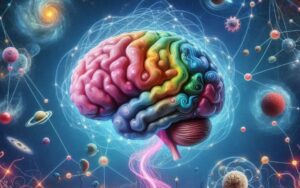Epigenetics essentially explores how our genes, like actors on a stage, can be influenced by the environment, playing different roles throughout our lives. Have you ever wondered why identical twins, despite sharing the same DNA, can have different colored eyes or develop different diseases later in life? It turns out, the answer lies in a fascinating field of science called epigenetics.
What is Epigenetics?
Think of your genes as instructions written in a giant book. This book called your genome, determines your basic traits like eye color and height. But imagine that certain sections of this book are highlighted or covered in sticky notes. These highlights and notes represent epigenetic changes – chemical modifications or attachments to your DNA that don’t alter the underlying instructions themselves but rather influence how loudly or softly those instructions are read.
How Does Epigenetics Work?
Epigenetic changes can occur using a few different mechanisms:
- DNA Methylation: This is the most well-studied epigenetic process. It involves the addition of methyl groups to specific regions of the DNA, which can block gene expression. High levels of DNA methylation are often associated with silenced genes.
- Histone Modifications: Histones are proteins that DNA wraps around. Chemical tags added to histones can alter how tightly the DNA is wound, making certain genes more or less accessible for transcription.
- microRNA: These small, non-coding RNA molecules can bind to messenger RNA (mRNA) and prevent it from being translated into proteins, effectively silencing the gene.All of these epigenetic mechanisms work together to fine-tune gene expression in response to environmental and lifestyle factors.
How Does the Environment Play a Role in Epigenetics?
Our environment, encompassing everything from the food we eat to the air we breathe, can leave its mark on our epigenome. Here are a few ways this happens:
- Diet: A diet rich in fruits, vegetables, and whole grains can promote healthy epigenetic modifications, while a diet high in processed foods and saturated fats may lead to less favorable ones. Imagine a healthy diet highlighting important instructions in the gene book, while a poor diet might obscure them with sticky notes.
- Exercise: Regular physical activity has been shown to positively influence our epigenome. Think of exercise as underlining important passages in the gene book, making them easier to follow for the cellular machinery.
- Exposure to Toxins: Cigarette smoke and other environmental toxins can disrupt healthy epigenetic patterns. This can be like someone scribbling all over the gene book, making it difficult to decipher the instructions.
How Can Epigenetics Affect Your Health?
Epigenetics has been linked to a wide range of health outcomes, from cancer and heart disease to mental health and aging. Here are a few examples:
Obesity and Diabetes: Studies on twins have shown that even when siblings share the same genes, differences in their epigenomes can contribute to one twin being overweight while the other is not. Epigenetic changes related to diet and physical activity appear to play a role in regulating metabolism and fat storage.
Cancer: Epigenetic alterations, such as DNA hypermethylation or histone modifications, are commonly found in cancer cells. These changes can silence tumor suppressor genes, allowing uncontrolled cell growth and division.
Stress and Mental Health: Chronic stress has been shown to trigger epigenetic changes in the brain, affecting the expression of genes involved in mood regulation, memory, and response to stress. This may help explain why some people are more resilient to the negative effects of stress than others.
Aging: As we get older, our epigenomes naturally undergo changes. These age-related epigenetic modifications are believed to contribute to the physical and cognitive decline associated with aging.
Can Epigenetics Be Reversed?
The good news is that epigenetic changes are often reversible. Certain lifestyle factors, like diet, exercise, and stress management, have been shown to positively influence the epigenome and potentially mitigate the effects of harmful epigenetic modifications.For example, studies suggest that a Mediterranean-style diet rich in fruits, vegetables, whole grains, and healthy fats can help reduce DNA methylation associated with inflammation and chronic disease. Similarly, regular physical activity has been linked to beneficial epigenetic changes that can improve metabolic health and cognitive function.
Is Epigenetics the Future of Health?
The field of epigenetics is still relatively young, but it holds immense promise for the future of medicine. By understanding how environmental factors interact with our genes, we may be able to develop new strategies for:
- Disease prevention: By identifying epigenetic changes associated with increased disease risk, we could develop interventions to prevent these changes from occurring in the first place.
- Personalized medicine: With a deeper understanding of an individual’s epigenome, doctors could tailor treatments based on a person’s unique genetic susceptibility to certain diseases.
- Mental health: Epigenetic changes are also being explored in the context of mental health conditions like depression and anxiety. Understanding how these changes occur could lead to new treatment options.
Epigenetics reminds us that our genes are not our destiny. While we inherit our DNA, we have the power to influence how our genes are expressed through our environment and lifestyle choices. By adopting healthy habits and minimizing exposure to harmful factors, we can promote positive epigenetic changes and take charge of our health in a whole new way.






